The Translate MedTech secondment scheme is still going ahead, with the deadline for applications being extended until 12 noon, 3 April 2020.
We will be urging all awardees to follow government advice and only start their secondments when appropriate to do so. If you have any questions, queries or concerns, please get in touch with Mohua Siddique.
Researchers developing medical technologies can apply for support and funding to gain fresh insights from new environments.
Translate MedTech has funding to support up to 10 secondments to enable researchers to temporarily take up a role in a complementary organisation, or to host a clinician, healthcare provider, or collaborator from industry or academia.
Applications to this scheme must support the development of innovation skills and/or the progress technologies towards clinical application.
We can provide:
Outgoing secondments provide an opportunity for academics, researchers, research students to broaden their experience, supporting:
Host organisations can include:
An incoming secondment may be more suited to your needs: allowing academics and researchers to host clinicians, industrialists or innovation specialists at their institutions.
Contact Mohua Siddique.
For further details, eligibility criteria and deadlines, download the Translate MedTech Secondment Scheme Guidelines and EOI Form.
Applications to be submitted by 12pm 3 April 2020.
The Translate MedTech programme is a partnership of universities in the Leeds and Sheffield City Regions with world-class expertise in the development of new medical technologies. Translate’s mission is to establish a sustainable community of academic, industry and clinical partners that are connected and committed to working in partnership to deliver a strong local economy and patient benefits.
A system developed by researchers at Leeds Beckett University aims to offer a ‘Virtual Physiotherapist’ service to patients recovering from stroke.
Through Grow MedTech the research team has been able to make critical connections with healthcare professionals and patient groups, as well as benefiting from funding for user-testing and development work.
Rehabilitation following a stroke can be extremely tough for patients, both mentally and physically. Physiotherapy sessions can help regain strength and movement – but regular exercise is key to success and this can be hard if patients struggle to attend clinics, or if they have to motivate themselves to maintain an exercise regime at home.
Tackling these challenges could alleviate a significant burden from the NHS: around 1.2 million people in the UK are currently living with the after effects of stroke and this is likely to rise as stroke increases among middle-aged adults. Clinical and social care costs amount to around £1.7 billion per year.
The Virtual Physiotherapist enables patients to carry out simple arm exercises at home and track their progress.
Using the system is as simple as sitting in front of a computer and carrying out the prescribed task, such as lifting a glass to drink or moving an object across a table.
Artificial intelligence in the computer’s software tracks the movements, building up a picture of progress over time.
The sort of technology employed by the Virtual Physiotherapist is likely to become increasingly available within healthcare settings. Its success, however, is entirely dependent on whether or not patients and physicians are inclined to make use of it.
Grow MedTech’s emphasis on involving end users in technology development from an early stage means the Leeds Beckett team have been able to make useful connections to guide development work.
Through Translate MedTech, Grow MedTech’s predecessor organisation, lead research Professor Dorothy Monekosso was able to make valuable links with clinicians and assistive technology experts through a network of clinical professionals.
“We had developed a prototype using funding from Royal Academy of Engineering and the University of Malaysia that showed how patients could use the system – but what we were lacking was input from clinicians about whether they saw a use for this sort of technology, and how they would use it,” says Professor Monekosso.
“Through consultations facilitated by Grow MedTech, we were able to get some really positive feedback, but also lots of development ideas.”
“Through the Grow MedTech and Translate MedTech events I’ve attended, I now have a wide group of clinical personnel in the region who are interested in helping us take this forward.
Grow MedTech’s support goes much further than just access to funding. Without access to NHS colleagues, it doesn’t matter how good the system or the technology – it just won’t go anywhere!”
Expressions of interest from clinical colleagues also helped the team secure Grow MedTech funding to further test the Virtual Physiotherapist.
During this phase, Grow MedTech Technology Innovation Officer Cat Colquhoun introduced Professor Monekosso to colleagues in Assisted Living Leeds, which draws together Leeds City Council’s assistive technology services and information.
“Through Assisted Living Leeds we were able to work directly with a group of stroke survivors and have them test out the system and give their opinion about how – and whether – they would use it,” says Professor Monekosso.
After confirming the clinical use and interest from patients, the team can explore in more depth what incentives will really encourage users to maintain regular use of the Virtual Physiotherapist.
A Proof of Market grant from Grow MedTech is enabling more work to be done with Assisted Living Leeds, working with patient groups to test different prototypes.
“We need to make sure we understand our patient’s motivation and how we can harness it,” says Professor Monekosso. “For example, when people play computer games, they might get coins or badges if they play regularly. Is that the sort of reward that would motivate our patients? That’s what we hope to find out in this next phase of research.”
Seven courses have been announced as part of Translate MedTech’s 2020 medtech innovation programme of learning, including a brand-new Business Case Planning and Pitching course where you can learn how to create a compelling business plan, and how to successfully pitch a commercial medtech opportunity to investors.
Our training programme is delivered through a flexible, pick and mix programme of introductory, stand-alone workshops, designed to equip researchers and business development teams with the skills to translate research ideas into medical technology products and clinical solutions.
The Translate MedTech Training and Development Programme is open and free to attend for PhD students, researchers, academics and business development staff in any one of the Translate partner universities (Bradford, Huddersfield, Leeds, Leeds Beckett, Sheffield Hallam and York).
Places for industry and clinical representatives are available at a cost of £300 per person and can be booked by emailing Mohua Siddique.
See the full course overview below:
This one-day training course will look at how to start innovating in the NHS context and will provide you with the practical tools to assess your research for potential in a healthcare setting.
Using real case studies, we’ll explore how innovation works in the NHS, the opportunities and potential pitfalls to avoid when developing your research into something that can benefit patients.
This training course will provide you with the information to confidently protect your technology, understand the differences between types of intellectual property, rights in property and ownership, and how to exploit them.
This training course will provide an introduction in how data protection and privacy should be used in the research and innovation process, how to ensure any personal data you will use from design to deployment is sufficiently protected and what ethical considerations you need when collecting data.
This training course will provide you with the insights and tools required to communicate a compelling commercial opportunity in a business plan and pitch that a team can unite behind and that prospective investors can support.
This training course provides an introduction to the regulatory requirements for placing medical devices on the market. It will help participants to understand the regulatory pathway to CE marking a device.
As well as guiding delegates through the Medical Device Directive, this training course will provide information about other relevant guidance, standards and the new Medical Device Regulations.
This training course aims to raise awareness about the benefits of involvement, help researchers think about how and when to involve public, patients and carers, and offers researchers a chance to develop a plan for involvement through activities and discussion.
This training course aims to raise awareness of the role of health economics in the development of new technologies, and to help researchers understand how health economics can be used at all stages of the innovation pathway. It will also offer opportunities to gain insights into technology development through activities and discussion.
Clare Green, Technology Innovation Manager at Grow MedTech, explores monitoring and diagnostic tools being developed in our partner universities.
As the new era of personalised medicine gets underway, doctors are requiring increasingly sophisticated and intelligent decision-making and monitoring tools. These diagnostic tools will help them make treatment decisions that are relevant to highly specific subsets of patients, or even personalised to an individual.
From wearable monitoring devices, to smart diagnostics that use artificial intelligence (AI) and machine learning (ML) to learn and adapt, these new technologies are becoming essential to help doctors spot conditions early and deliver the right treatment, at the right time.
The potential benefits to patient wellbeing, as well as the savings in NHS resources, are significant.
At Grow MedTech, we support researchers to evidence how their technology developments will provide such savings.
Our Proof of Market and Proof of Feasibility funds can help researchers move projects through the early development stages, where it is often hard to find funding, but where being able to demonstrate aspects such as market need and health economics is crucial for moving to the next Technology Readiness Level.
The University of York has particularly impressive capabilities in the field of imaging, biosensing and diagnostics technology, with cutting-edge research being carried out in a number of departments and access to facilities such as its Centre for Hyperpolarisation in Magnetic Resonance (CHyM) and the Bioscience Technology Facility.
These facilities put the University in a great position to take advantage of our support.
One area in which York is excelling is in the use of microwave technology in diagnostics – specifically to measure the depth and severity of burns.
A team led by Professor Roddy Vann, in the York Plasma Institute, is currently working on a prototype device that can provide a 3D image of temperatures up to 2cm below the skin by measuring microwaves naturally emitted by the body, the strength of which depends on the temperature of the tissue.
This is expected to greatly advance research into burn progression through direct imaging of the damaged area.
Microwave imaging of burns has been considered in scientific literature since the 1970s but technical challenges have so far limited its translation into the clinic.
This device is innovative in combining recent advances in the design of antennas and ultra-fast data acquisition with the potential to make microwave medical imaging both technically and commercially viable.
We are helping to de-risk the project by demonstrating the feasibility of the prototype and supporting the team to develop the mathematics and software that will convert the complex signals that are emitted from the burn into a usable image that can be used by healthcare professionals to judge its severity
Scientists from industry partner, Sylatech, are co-inventors of the technology, working alongside Grow MedTech and the York team to commercialise the technology.
Working closely with industry from an early stage is always important and the link with Sylatech is particularly strong, having grown from its early days as a Knowledge Transfer Partnership.
We’ve also been fortunate to bring in clinicians from specialist burns centres at the Queen Elizabeth Hospital in Birmingham and Pinderfields Hospital in Wakefield – as well as Patient and Public Involvement groups – to guide this research.
Measuring the body’s heat signals is a promising area for diagnostics, and one in which Sheffield Hallam researchers are also focusing their attention with our support.
This time, infra-red thermal imaging cameras are being employed to help with decision-making, by predicting the likelihood of surgical site infection in women after Caesarean section.
Around 200,000 women undergo caesarean sections each year. Since it is hard to tell, by looking at a wound, whether or not it will become infected, women are routinely prescribed prophylactic antibiotics.
Identifying infections early and treating them appropriately will reduce patient risk, and cut down the number of antibiotics prescribed.
In the University’s Centre for Health and Social Care Research, Professor Charmaine Childs’ team is using Grow MedTech funds to investigate the potential market for the device before making a bid for significant national funding to refine the design and software ahead of a clinical trial.
In this way, our support is helping to bridge the gap between early stage research and more advanced technology development.
One area in which diagnosis is particularly difficult is in diseases marked by cognitive decline, such as Alzheimer’s.
There are a number of challenges, including finding reliable biochemistry tests that can accurately measure changes, and obtaining the right samples from a particularly vulnerable group of patients.
At Leeds Beckett, we funded a Proof of Market project, led by Dr Nat Milton, to progress a non-invasive test based on saliva samples. Working with the University of Huddersfield and the University of Roehampton, Dr Milton’s team has identified biochemical markers called kisspeptins that are found in saliva and can be linked to Alzheimer’s.
We worked with Dr Milton to support a detailed exploration of the potential market for this test, along with an early stage cost benefit analysis. The results were extremely positive, showing a clear market opportunity for a test of this type.
The next step for the team will be able to finalise its development and produce a prototype device. It’s clear that there’s an urgent need to be able to diagnose Alzheimer’s more accurately and at an earlier stage and so it’s particularly exciting to see this technology progress towards the clinic.
Are you a PhD student or post-doctoral researcher interested in learning about the new medical devices/healthcare technologies development process? Or gaining experience in providing expert advice that supports new healthcare products getting to market?
Translate MedTech is offering an opportunity to work with the NIHR Children and Young People MedTech Co-operative (NIHR CYP MedTech) team.
This Translate MedTech secondment opportunity is available at two days (or 15 hours) per week for 2 months, starting March 2020. The ability to be flexible with days would be advantageous.
Up to £2,500 is available to cover travel, accommodation and subsistence costs. The successful candidate will be expected to work from the Sheffield Children’s NHS Trust and may occasionally be asked to attend meetings off-site with staff members.
The successful candidate will support NIHR CYP MedTech in delivering their remit and work in collaboration with all stakeholders for the benefit of children and young people.
This will include but not be limited to:
NIHR CYP MedTech is the only MIC dedicated to child health and paediatrics. Our vision is to become a world class centre for the development of child health technology. We work across academic, industrial, and clinical sectors to support the development, clinical evaluation, and adoption of child health technology
Translate MedTech is a partnership of universities in the Leeds and Sheffield City Region with world-class expertise in the development of new medical technologies: the University of Bradford, University of Huddersfield, Leeds Beckett University, University of Leeds, Sheffield Hallam University and University of York.
Application closing date: 12pm on Friday 7 February 2020.
Over 130 delegates from across the medtech sector joined us on Friday 6 December 2019 to learn more about the current innovation landscape in the Leeds and Sheffield City Regions at Growing MedTech Translation 2019.
The packed agenda included three speakers from actively supported Grow MedTech projects, student pitches from recipients of Translate MedTech Summer Student Project Funding, and medtech pitches from six hopeful project teams who sought to impress a panel of independent innovation specialist ‘dragons’ for the chance to win £10,000 in innovation funding support.
Other key speakers included Prof John Fisher, who highlighted the need for medtech innovators to recognise that successful new innovative medical products that come to market over the next decade will be driven by technology convergence, and by patient and population needs.
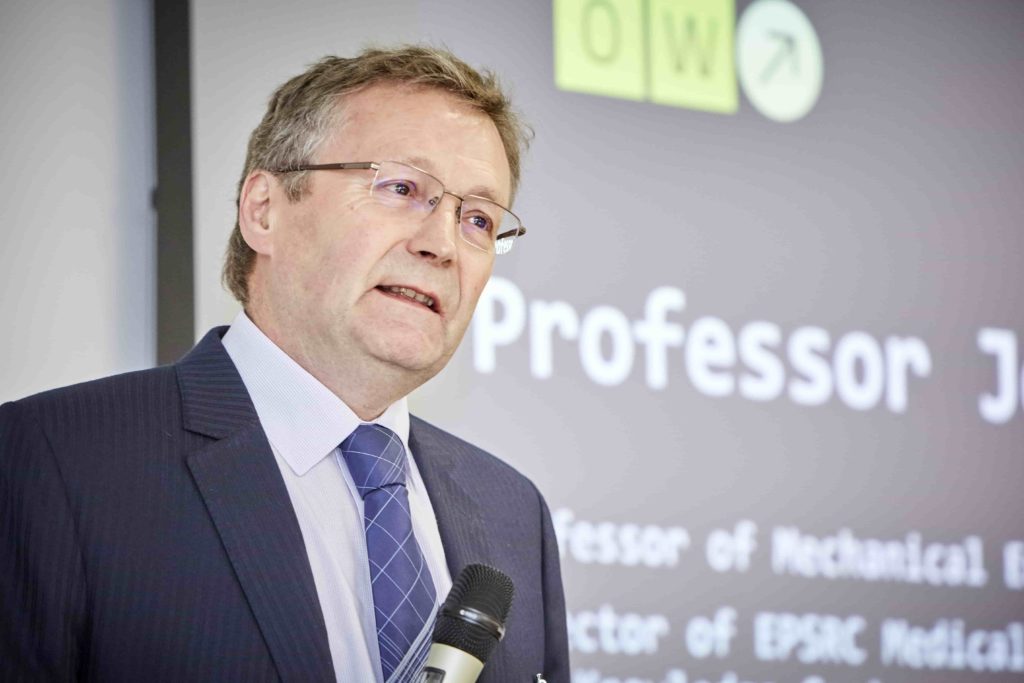
Our keynote talk was given by Dr Rosie McEachan, director of Born in Bradford who spoke on the importance of end-user insights in developing impactful solutions to unmet healthcare needs.
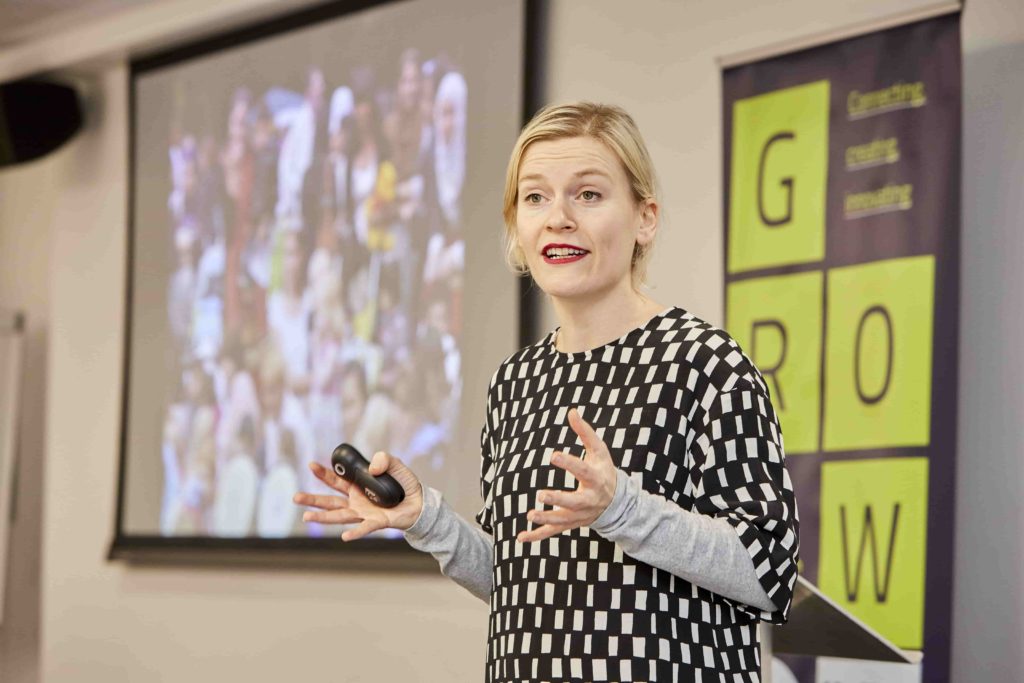
Presentations throughout the day were balanced by a long break for lunch and networking.
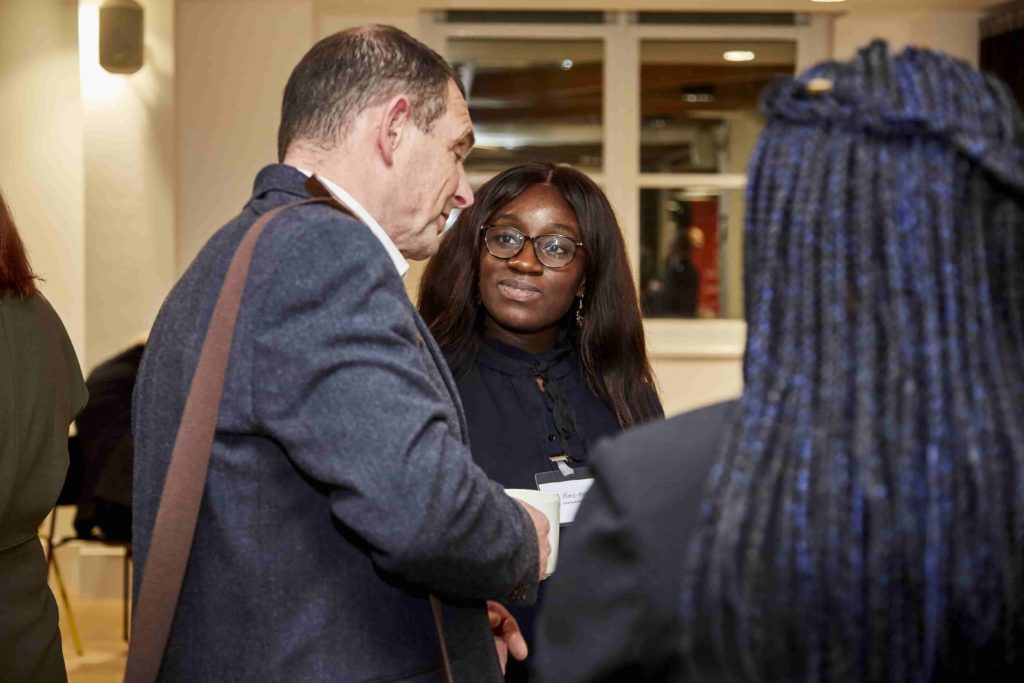
During this break, delegates had the opportunity to network with representatives from nine organisations at their exhibition stands and discuss regional opportunities that may be of interest.
Each student who gave a presentation about their Translate MedTech summer project also had the opportunity to present research posters to delegates to facilitate networking.
Dr Will Bolton was awarded a £50 Amazon voucher after delegates voted that he presented the best pitch and poster of the day about his Translate MedTech Summer Student Project on developing circular frame fixators for leg fracture patients in developing countries.
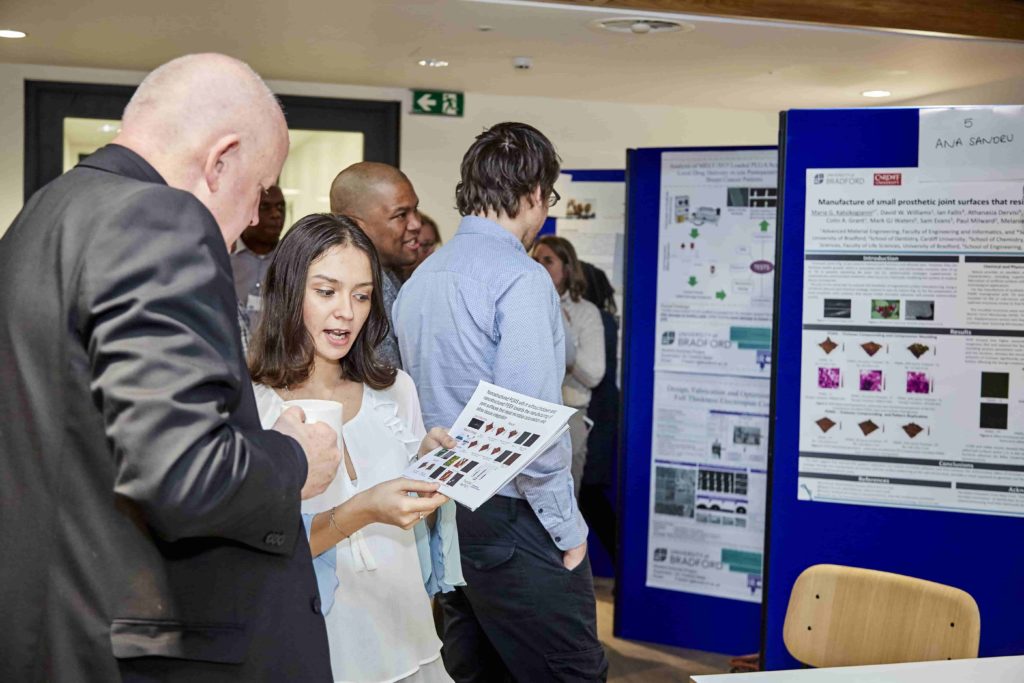
Based on their use of Sli.do, a clear highlight of the conference for the entrepreneurially-minded was the Pump Prime Funding Competition pitches.
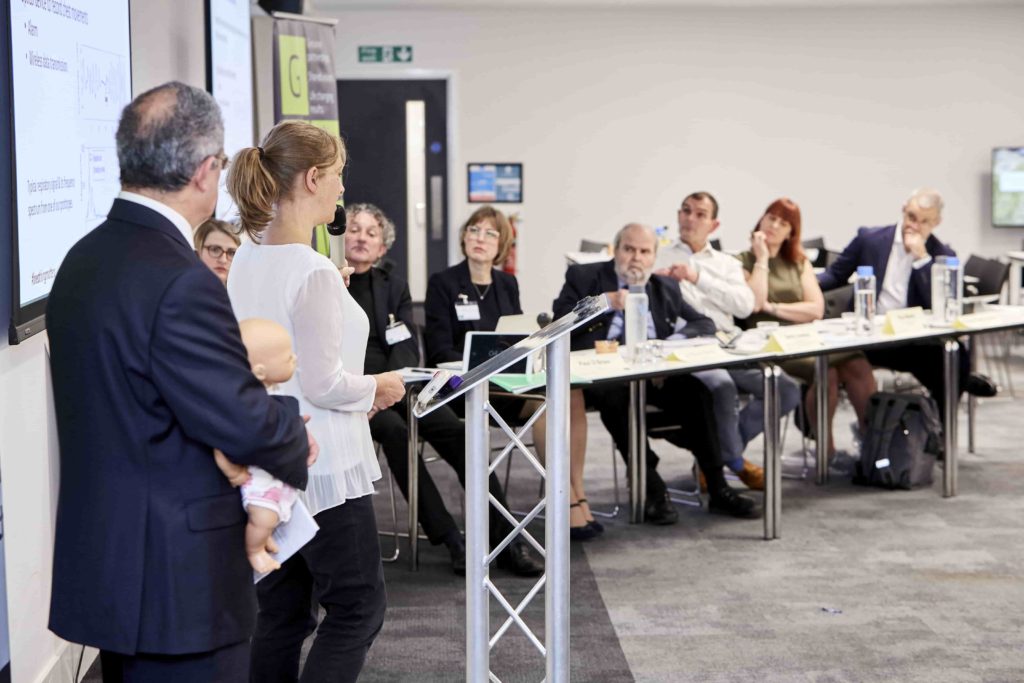
The audience submitted more than 80 questions to quiz the six hopeful contestants, with topics ranging from technology specifics, to questions around IP and business scalability.
Following a lengthy discussion between the dragons and an audience vote, Prof Reza Saatchi and Heather Elphick were announced as winners of the Pump Prime Funding Competition, and the £10,000 innovation funding prize.
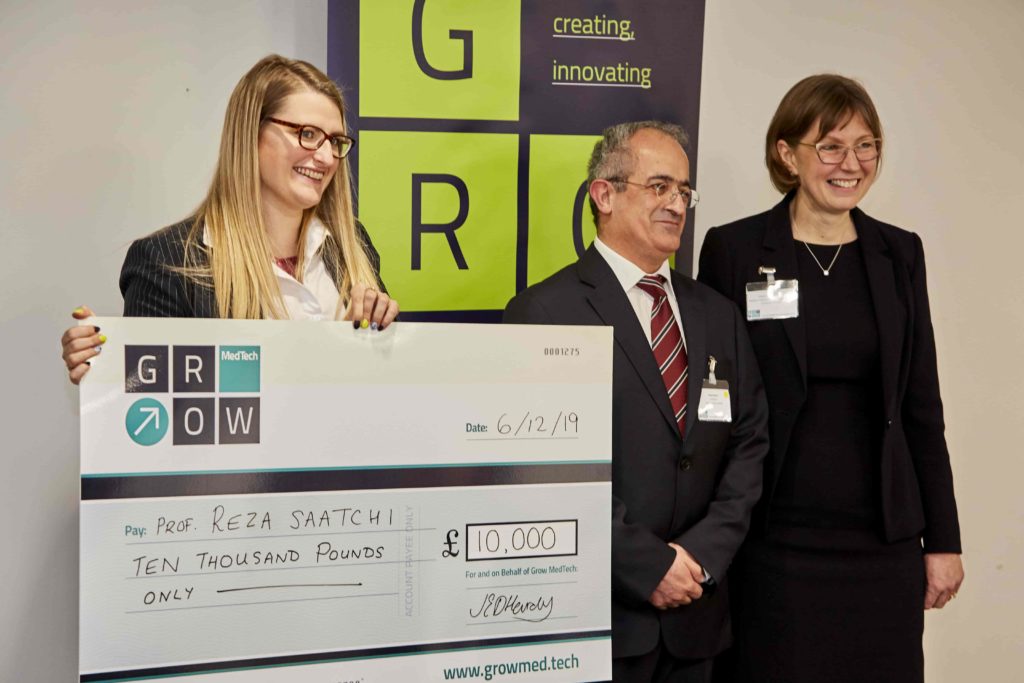
Stay up to date with future Grow MedTech and Translate MedTech events by signing up for our mailing list.
On February 18 2020, The National Physical Laboratory (NPL) is hosting MMN: Innovation in medtech to showcase organisations and services in the region that can support medtech innovators.
Here is an example of the support they’ve provided to a medtech SME in the past, and the type of benefit that they could offer to your medtech development process.
3D imaging for disease or trauma often relies on expensive CT scans, which deliver large radiation doses. Cheaper X-ray techniques only produce 2D scans. Adaptix has developed a solution to the combined shortcomings of existing technologies: a novel X-ray source that allows low-cost, truly portable 3D scans.
The innovation is a flat panel X-ray source. It takes multiple low dose X-rays and uses algorithms to turn data from the many ray paths into a 3D image, a technique known as ‘Digital Tomosynthesis’ (DT). This provides better clinical insight than 2D imaging, but using a fraction of the radiation of CT scans.
A novel aspect of the panel is the grid of cold cathode field emitters – an array of tips which each generate a controlled X-ray. Many emitters can be packed onto a single panel allowing multiple simultaneous X-rays.
This is the first time a two-dimensional array of cold cathodes has been used for medical X-rays; other devices use bulky X-ray tubes. Adaptix compares this advance to moving from cathode ray tube TVs to flat screens.
The X-ray emissions need to be highly uniform in order to build a reliable 3D image. The emitters also need to meet durability requirements mandated for clinical use. Investigation revealed inconsistencies in the emitter tips, compromising both of these requirements.
Adaptix worked with NPL, initially through the Analysis for Innovators Programme, to understand how it could improve the materials of its cold cathode field emitters, and thereby improve performance.
Adaptix developed new materials and coatings which it hoped would improve the product and sent these to NPL to test and validate.
NPL applied a wide range of state-of-the-art analysis tools to examine the structural and chemical properties of the material samples, including high resolution scanning electron microscopy (SEM) for structural analysis, and X-ray photoelectron spectroscopy (XPS) and secondary ion mass spectrometry (SIMS) for chemical analysis.
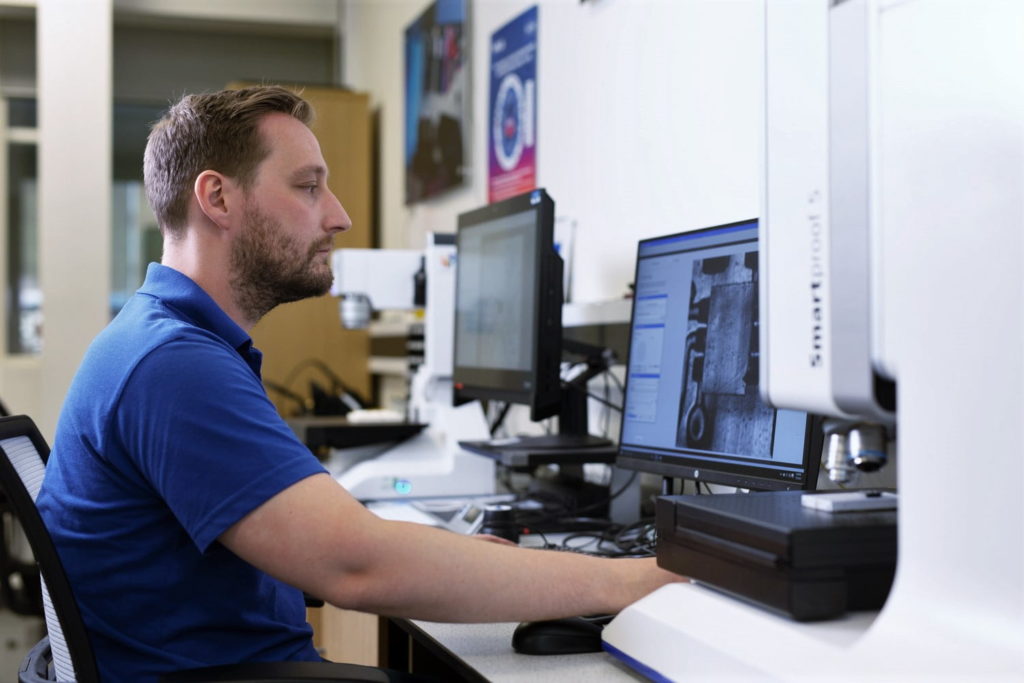
Measurements were taken of the geometry of tips, quality of coatings, contaminants and oxidation state.
Research revealed differences between tip geometries and coating quality which potentially affected X-ray emission uniformity, identified surface chemistry contamination caused by manufacturing processes, and highlighted the impact of high current on material degradation.
Through this research, Adaptix was able to improve uniformity by identifying optimal materials and coatings. It also helped them remove sources of contamination which they were not aware of – an issue that may have become a serious problem down the line.
Additionally, measurements of how materials responded to different vacuum conditions allowed Adaptix to implement control mechanism to limit failure, such as identifying the optimum vacuum levels. All of which improves the performance of the product.
The work with NPL helped Adaptix understand their device and its failure mechanisms better, helping them make informed choices about design, material selection, surface chemistry and operating conditions.
It also helped them identify approaches that wouldn’t work and abandon them early, as well as identifying errors and contamination sources, freeing up time to focus on work that would deliver results.
This improved the efficiency of their R&D and will reduce their time to market.
NPL allows UK SMEs access to the best that the UK’s world-leading science base has to offer. Working with NPL allows Adaptix to ‘stand on the shoulders’of a giant of science to characterise materials at the smallest of scales.
We are now extending that successful relationship through NPL Scotland supporting us as we mobilise manufacturing, showing how NPL’s leading-edge science flows through into economic activity and the creation of high-value jobs.
Mark Evans, CEO – Adaptix
To learn more about organisations and services in the Leeds and Sheffield City Regions that can support your medtech development, join us at the upcoming MMN medtech innovation networking event on February 18 2020.
Kieran Perkins, Technology Innovation Manager at Grow MedTech, describes how we are supporting more and more digital healthcare technologies and combining digital with other technologies.
Digital technologies are breaking down the walls of the medtech industry, enabling companies – and academics – that are new to medtech to apply their knowledge within the sector.
This is true at all levels, from big players such as Apple (who recently appointed a senior cardiologist) and Google (who recently bought Fitbit) to the smaller companies and individual academics who are using their know-how to develop digital health technologies.
Dr Steven Fenton from the University of Huddersfield, for example, is an electronic engineer with a research interest in audio quality in music production.
Grow MedTech is supporting his project to create a 3D ‘audio map’ to help blind and visually impaired people navigate their surroundings.
He is adapting software he developed for another purpose to translate a visual image into a sound picture and identify potential obstacles in the user’s path.
Although digital health products may seem very different to traditional medtech, the same criteria need to be applied to their commercialisation.
Dr Fenton has received our earliest stage funding, to help him establish clinical need and market opportunity for the software and identify the best direction to take.
The same questions need to be asked of this project as for any other – for example: does this technology meet a clinical need, is there a commercial opportunity for it, what competitors are already out there?
But that’s not to say there aren’t new challenges and questions being raised by digital healthcare technologies, and these focus mainly on trust, transparency and data management.
Will patients trust decisions made by software, rather than people? How clear can we be about how decisions or results are arrived at, when this is done by an algorithm? How will the data gathered be used, stored and managed – and who owns that data?
The regulatory bodies are themselves still battling with many of these questions, though some changes are already in the pipeline.
New EU regulations for medical devices (MDR) and in vitro diagnostic medical devices (IVDR) due to be introduced place more stringent requirements on the majority of digital technologies – essentially any that affect diagnostic or therapeutic decisions.
This will result in a more onerous regulatory process which has caused some companies to revise their strategies.
The EU’s Ethical guidelines for trustworthy Artificial Intelligence (AI)’ set out factors which need to be continuously evaluated and addressed throughout the AI systems lifecycle and this will impact on all health technologies that use AI or machine learning.
A key difference in a medical device that’s built on machine learning is that it’s not set in stone once developed.
Unlike a more traditional device, an algorithm is intended to be dynamic and evolve over time which means it can keep improving and changing as it learns more from more data.
We’re supporting a project at the University of Bradford using machine learning to assess the quality of donated organs for transplant.
Assessing organ quality is complex, requiring multiple factors to be taken into account and some subjectivity can’t be avoided.
As such, individual surgeons, teams and hospitals can come up with different assessments for the same organ. The surgeon conducting the transplant has to make the final call – a very difficult decision, particularly with organs of marginal quality.
Professor Hassan Ugail is developing an algorithm that can score organs more objectively, by combining multiple data sets – including lab test results and patient survival rates – with a colour spectrum analysis that has been shown to relate to quality.
The aim is to combine the expertise of multiple professionals into one assessment tool that grades the organ to give the transplant surgeon more confidence of success, so that no organ is unnecessarily rejected.
The regulation for technologies such as this may still be uncertain, but at Grow MedTech we don’t let this block development in any way.
Instead, we carry out horizon scanning, identifying the trends and ensuring projects put in place the elements they are likely to need for likely future regulation, to mitigate any risks.
This usually means showing project teams have considered those key issues of trust, ethics, transparency and data management. These can be addressed by ensuring end user or patient involvement, or by bringing in specialist expertise.
A project we’re supporting at Sheffield Hallam University, involves Dr Lynne Barker, who is working with a software development house with no previous experience of medtech.
We’ve brought in a regulation specialist to work with the company, to ensure they fully audit and evidence the necessary steps during development to meet regulatory requirements.
The technology is based on a test – in the form of a cooking exercise – to assess cognitive function in people with traumatic brain injury, stroke or mild cognitive impairment (the precursor to dementia).
In trials, the test was able to distinguish between the three conditions. Patients with mild cognitive impairment didn’t complete the ‘meal’ on time, those with stroke usually forgot an ingredient whereas those with traumatic brain injury tended to undercook the food.
The software company is now developing this into an app that can go into clinical trials.
At Grow MedTech, we’re supporting more and more digital healthcare technologies or projects that combine digital with other technologies.
These are often exciting projects to work with, as the speed of development can be much faster than traditional medtech. But however rapid the development itself is, there’s no substitute for properly assessing the potential for commercialising the technology.
And this is where our help and support, for digital as for other technologies, can really make the difference.
A team of academics and clinicians from Sheffield Hallam University (SHU) and Sheffield Children’s Hospital (SCH) triumphed in a Dragons’ Den-style pitch competition to win £10,000 of medical technology funding.
The money will be used to advance the development of a device that utilises innovative method to monitor central sleep apnoea in young children and infants.
Led by medical engineer Professor Reza Saatchi, the project team comprised of Professor Heather Elphick, Dr Ruth Kingshott and Dr Nicki Barker from SCH, alongside Dr Ruth Evans and Anthony Jones from SHU.
The team impressed Grow MedTech’s panel of independent dragons with their plans for technology that can help clinicians to monitor the respiratory condition in children and infants.
Central sleep apnoea, which affects around 1% of all infants, is a type of breathing disorder that occurs during sleep and causes individuals to pause their breathing. These incidents can be serious enough to require hospital admission.
Reza Saatchi, Professor of Electronics at SHU, said: “We are delighted to have won the prestigious Grow MedTech Pump Prime competition. There is currently a clinical need for a reliable and cost-effective device that allows home monitoring of infants and children with central sleep apnoea, and it is testament to the strength of our 15-year research and innovation partnership with Sheffield Children’s Hospital that we have succeeded in winning this highly competitive research prize which allows us to meet this important medical need.”
The competition was part of Growing MedTech Translation 2019, a Leeds-based event hosted by Grow MedTech. The event brought together more than 100 delegates from the medtech sector to hear talks from innovators and to network.
Alongside the dragons – made up of medtech experts and patient representatives – delegates at the conference were able to vote for their favourite research innovation, for which the SHU/SCH team also came out on top.
The £10,000 Pump Prime funding and innovation support is to be used to de-risk and advance the development of the technology towards commercialisation and being used by patients. There are currently needs for a device that can be used to achieve accurate, reliable, easy to use, child-friendly and cost-effective home monitoring of central sleep apnoea.
The SHU/SCH project focuses on the paediatric population, but the technology is equally applicable to adults and can reduce NHS costs by monitoring patients at home to allow more timely detection and treatment.
This is an opportunity for an enthusiastic, efficient, creative and flexible administrative assistant to join the Medical Technologies Innovation team.
The University of Leeds has significant capabilities that support the development of new medical technologies and these are united under a single gateway – Medical Technologies at the University of Leeds.
Medical Technologies encompasses several major research and innovation programmes and projects: the Medical Technologies Innovation and Knowledge Centre, Translate MedTech and Grow MedTech hosted by the Institute of Medical and Biological Engineering at Leeds.
Grow MedTech, funded through Research England’s Connecting Capability fund, is a collaborative partnership between 6 Yorkshire universities (Leeds, Bradford, York, Huddersfield, Sheffield Hallam and Leeds Beckett) which aims to develop and share best practice in the translation and commercialisation of medical technologies.
It brings together the best minds in engineering, biological development, design and manufacturing together with industry to drive medical technology products into everyday use to improve the quality of life for people across the world.
You will be an experienced administrator with experience of arranging and servicing meetings and events, taking minutes, diary management, raising purchase orders and arranging travel. You will have a flexible, proactive approach and excellent communication skills.
To explore the post further or for any queries you may have, please contact:
Dr Josephine Dixon-Hardy, Director of Medical Technologies Innovation
Tel: +44 (0) 113 343 0920 or email: J.E.Dixon-Hardy@leeds.ac.uk